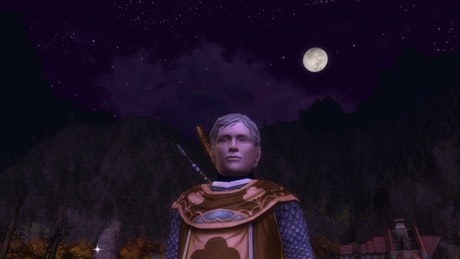Vanderbilt University's class is about transmedia and remediation. Instructor Jay Clayton uses the various interpretations of J.R.R. Tolkien's Middle Earth to discuss the differences in how each form of media tells a story. Class lectures discuss Tolkien's original novels (The Hobbit and The Lord of the Rings series), Peter Jackson's movies, Turbine's Lord of the Rings Online, and the various epic poems that inspired the original lore. Professor Clayton really makes the class great with his critical analyses of each form of media. He doesn't look at each form of media and judge them by how well they stick to the original lore. Instead, Professor Clayton discusses how well each form uses imagery and conveys emotion.
One interesting lecture discussed the criticism of science fiction and fantasy as being called escapist entertainment. Escapism is described as having no relation to the real world. Learning and real world application do not derive from escapism, only the temporary relief from day-to-day stress. This is a criticism that is often applied to video games. Clayton explains that video games are the newest form of entertainment and are cycling through the same rounds of criticism that novels, poetry, painting, and others went through before. It feels good to hear a rational statement like this. I plan on exploring this argument further.
Monday, June 22, 2015
Sunday, June 21, 2015
A Whole New Mind: Why Right-Brainers Will Rule the Future by Daniel H. Pink
My own life experiences support Pink's argument. I graduated with a degree in business (a common pursuit as Pink points out several times), and found success, but it wasn't until I started practicing more creative skills that I began to feel fulfilled.
There are several take-aways in A Whole New Mind. I look forward to putting the following into practice:
- Design: Looking at everyday objects and thinking about their design (beauty and utility).
- Empathy: The group activity of guessing the high and low points of a coworker's day and then comparing them against that person's actual responses.
- Empathy/Story: Taking acting/improv classes.
- Empathy: Interviewing coworkers to learn the professional/personal path they took in life.
- Empathy: Volunteering more.
- Symphony: Listening to symphonies to understand the complexities of how small pieces make up a whole.
- Symphony: Keeping an inspiration board for everyday things that can enhance a current/future project.
- Symphony: Having more organized brainstorm sessions.
- Meaning: Assembling a list of things I am thankful for. One for every year of my life.
- Meaning: Taking spirituality, and the exploration of spirituality seriously.
- Meaning: Taking time out of the day/week to practice mindfulness.
Saturday, June 20, 2015
LIMBO
This summer I have taken full advantage of the Steam Monster Summer Sale to stock up on games that have long been on my list. One of those games is LIMBO: a 2D black and white side-scrolling puzzle game featuring an unnamed boy searching for his sister. The game arms the player with simple core mechanics (run, jump, climb, grab, push, and pull) which are nicely complemented by a basic physics system. Advanced mechanics are gradually introduced in the game at certain points (reverse gravity, activate magnets, etc.).
The colorless artwork, continuous gameplay, and minimal background noise create a very eerie ambiance in LIMBO. You encounter giant spiders, band saws, bear traps, and many other unpleasant obstacles throughout the game, all while tackling increasingly more difficult puzzles. The story is limited which leaves much room for the player to contemplate and inject his/her own meaning. I would not have realized it was the character's sister I was searching for had it not been for an abstract I read after playing.
LIMBO is unique in that it triggers emotions not typically experienced in a platformer (sadness, hope, hopelessness, wonder). This was a short game, without much of a story and yet it packed more of an emotional punch than any movie I have seen recently. One could spend a good amount of time pulling deep meaning out of LIMBO. I recommend this game to anyone who is struggling with the "games as art" argument. If LIMBO is not a work of art then I don't know what is.
Subscribe to:
Comments (Atom)
